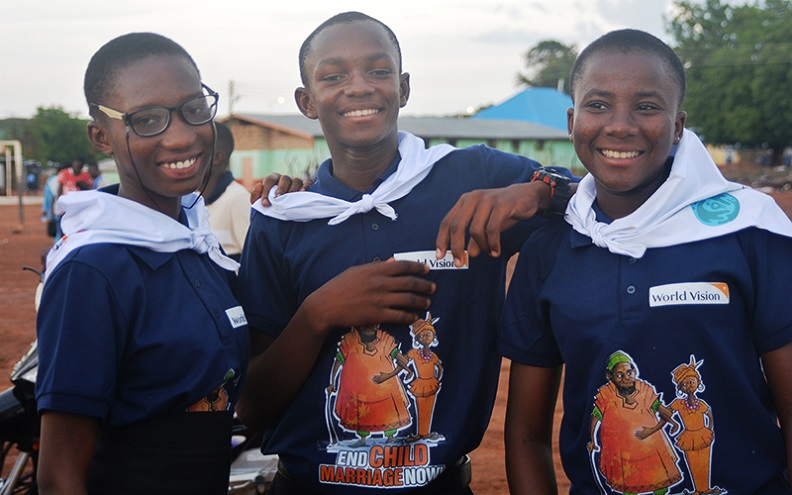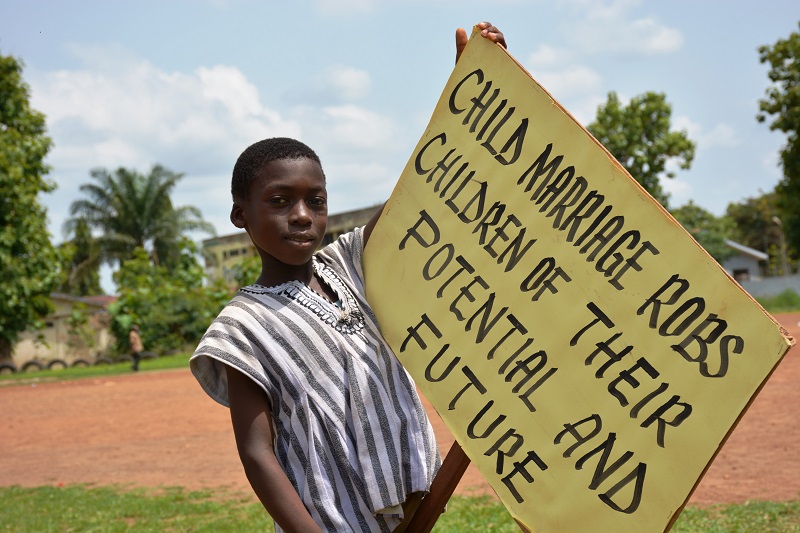Sarafina, 15, lives in Pong-Tamale, a rural area in the Savelugu municipality within the Northern Region of Ghana an she advocates to end child marriage in her community. In Ghana, more than one in five girls marries before age 18—5 per cent of those girls become brides before they turn 15.
In Ghana, child marriage is accepted because some people believe it acts as a religious atonement. As well, prevailing gender norms mean girls are of less value than boys so they are sold to other families. Finally, migration means that families may feel it necessary to sell their girl child for economic stability, in hopes of giving her a better life. Thankfully, the government of Ghana has committed to eliminating early and forced marriage of children by 2030. Sarafina is part of this change.
She lived with her paternal grandmother and two younger siblings as a World Vision registered child. Her experience of coming from a broken home was motivation enough to encourage the young girls of her community to enroll and stay in school.
Sarafina recounted, “Growing up, I felt lonely because I witnessed my parents fight up until they divorced. At age four, my grandmother came to visit us in Accra and I followed her to Pong Tamale. After some time, I decided not to return to Accra. Although I sometimes felt the absence of my parents, my grandmother gave me all the support I needed, and it made me forget the past and rather made me strong to focus more on my education, so that I can become a better person in future to cater for my children.”
 Students in Savelugu, Ghana demonstrate their support in ending child marriage.
Students in Savelugu, Ghana demonstrate their support in ending child marriage.
During junior high, Sarafina became a member of World Vision’s Child Parliament, which gives children a voice in public debates and enables them to hold authority figures accountable. Through her hard work and dedication, both sides of the house unanimously agreed that she should lead the Child Parliament after her predecessor left for senior high school.
Sarafina explained, “My experience as a child from a broken home taught me to empower girls never to lose hope, but to have self-worth in order to stay away from men and report any issues of child abuse, especially child marriage, to the Child Parliament so that we can take it up with the appropriate authorities. I see World Vision’s effort to end child marriage as an issue that needs to be tackled collectively. That is why, through the education and empowerment we have received from World Vision, we have been able to rescue a lot of girls from child marriage who are now back in school.”
She continued, “As child parliamentarians, we educate parents on the importance of keeping their girl child in school instead of giving them out for marriage. We also investigate cases of child marriage and warn the perpetrators, after which we report and refer the case to Social Welfare for action to be taken.”
Sarafina further noted that, although she’s sometimes opposed in her advocacy work, she is not discouraged. She said, “Sometimes, when I go to educate parents, they tell me I am just a little girl and for that matter cannot tell them what to do. Some of my friends also mock me, calling me names like ‘Too Known Girl’, but I am not bothered.”
Sarafina believes child marriage is the leading cause of violence against children in her community, and that It needs to be eliminated from her community and county. We couldn’t agree more.
 A student raises awareness at Savelugu, Ghana where an event was held by WVGhana to help raise the voices of youth in influencing their community to end the practice of child marriage.
A student raises awareness at Savelugu, Ghana where an event was held by WVGhana to help raise the voices of youth in influencing their community to end the practice of child marriage.